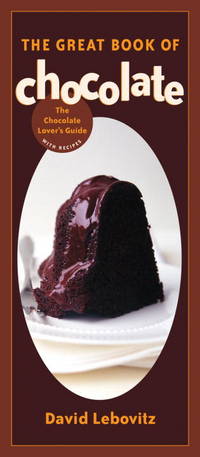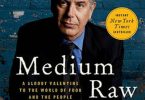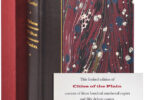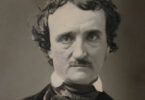David Lebovitz is the author of the bestselling cookbook, Room For Dessert, as well as The Great Book Of Chocolate, The Perfect Scoop, and Ripe For Dessert. David was named one of the “Top Five Pastry Chefs in the Bay Area” by the San Francisco Chronicle, and he’s received critical acclaim in such publications as Bon Appetit, Chocolatier, Cooking Light, Food and Wine, Gourmet, Conde Nast Traveler, Cook’s Illustrated, Newsweek, the New York Times, People, Saveur, Sunset and USA Today. He currently resides in Paris, and took the time to discuss his favorite cookbooks, American eating habits and working with Alice Waters.
You have four cookbooks under your belt, including a comprehensive guidebook for chocolate and the notable Room For Dessert. When did you first think about writing a cookbook?
Working in restaurants for so many years, I developed quite a repertoire and people were always asking for recipes…and I was always giving them. So I thought, “Hmmm. Why am I giving them away for free? People should pay me for them!”
Seriously, though, as most cookbook authors will tell you, writing a cookbook is a major labor of love and is truly about sharing recipes. Especially baking, which is really something that people like to share.
My first book, Room For Dessert was really a labor of love: it was the culmination of over 20 years of work and many people tell me it’s their all-time favorite baking book. It just went out of print and now is hard to find, but I hope it will be back in print in the future.
 Many people don’t realize that cookbooks are more than just recipes and beautiful pictures. They take painstaking efforts to get published. Would you care to recount any particular moments during the publication process?
Many people don’t realize that cookbooks are more than just recipes and beautiful pictures. They take painstaking efforts to get published. Would you care to recount any particular moments during the publication process?
The most painstaking part of the process is washing all those dishes! Yikes. That’s the dirty secret–pardon the pun–about writing a cookbook. Try making six or seven cakes at home. When people complain to me about cleaning up a couple of pots and pans, I laugh in their face. Ha! They should see my hands…
I was fortunate to do the food styling for my books, except for The Perfect Scoop. Since it was ice cream, it required someone with expertise with that. But the team I worked with were very experienced with food, as well as photography, and I knew they’d eat anything I made…and talk about it later to other cookbook authors and food people. So I made sure everything was fresh, not stale, and real for the photos.
Shooting three or four desserts a day meant I needed to make several batches of each thing. That almost killed me. And talk about dishes!
What cookbooks do you recommend for every home cook?
A very good book of just basics, I think, is Alice Waters’ The Art of Simple Food. It covers the standards, but is updated for today’s cooks with things like simple recipes for polenta, pizza dough, and salad dressing. The Zuni Cafe Cookbook by Judy Rodgers is my favorite cookbook ever, I think. She explains everything, and is not just a great chef but a terrific writer.
For desserts and baking, any book by Alice Medrich is a winner. Is there anything she can’t do perfectly? Her recipes are easy to follow and always come out great. And she loves chocolate.
Did you cook growing up?
Yes, my therapist once told me she thought I was a victim of child neglect because my parents left me home alone at an early age. I’m not sure about that assessment, but what was criminal was that they left me with TV dinners. I wasn’t a picky eater, but I got tired of them pretty quick.
So I started flipping through my mother’s Settlement Cookbook and landed on “Chocolate Souffle.” Since we had the chocolate, eggs, and sugar on hand, I started there. Then I graduated to Good Seasons salad dressing, which taught me everything I needed to know about measuring ingredients accurately, with those cruets marked with lines indicating how much to pour up to where.
What are your top five frequently-used ingredients for cooking?
Butter, sugar, chocolate, eggs…and red wine (for the cook).
There are so many avenues to take in the cooking world. When and why did you decide to become a pastry chef?
I was working in the cafe at Chez Panisse and had a flash of brilliance. I figured, “If brain surgeons were more in demand than regular doctors, with all these cooks around, I should specialize in something.” Aside from the flashy Mercedes I envisioned myself driving every day to work, I was attracted to baking because I love fruit and chocolate. Every peach I cut open, every block of chocolate I chop, and every time I switch on my KitchenAid mixer, I get a little excited.
I never got the flashy Mercedes, though. But my mixer gives me just as much pleasure, I think.
You currently reside in Paris. Do you notice a significant difference in eating habits between Americans and Parisians?
Boy, do I ever.
Many Americans are really afraid of eating. They have to know what they going to get. If the menu says, “steak”, they need to know what cut, what comes with it, is there sauce, how it’s going to be served, etc. In France, you just order and get what you’re given. And you eat it.
In spite of the fact that Americans are some of the largest people on the planet, many are obsessed with dieting. There’s always some diet book on the bestseller list. It’s a bit crazy. I had dinner in Paris with some woman from California who actually blotted the butter off her fish with her napkin. You would never, ever see a French person doing that.
People do talk about diets here though, in spite of what we think. And people, especially younger women, are terrified of getting fat. It has much more of a stigma here than in the states. That’s why over 50% of young people in France smoke like fiends. Teenage girls puff like smokestacks.
Do they even broadcast the Food Network there?
No, but there are two food channels. One is pretty goofy and dumb and the other is pretty good. The chef-driven shows aren’t interesting. But the ones where they go visit some village in the mountains where a family makes a candy using the milk produced by three specially-breeded cows that they raised in a pasture near their alpine village that only produce milk on days with two vowels in them are good. The whole family gathers around the cauldron and cooks the milk in native garb, which they’ve been doing for centuries.
That kind of stuff still exists in France. I love it.
Can you tell us about your training in two different European institutes?
The European attitude is very different. In America, the attitude is “I’m paying for the education, so teach me.” Or “I’m an employee, I’m doing you a favor by working for you.”
In France, it’s an honor to work for a great chef and many people do it for free for the training. Now some of the top French restaurants are charging interns for the privilege of working there. Anyone that’s ever trained a new employee knows it’s actually quite a lot of extra work, so in a way it makes sense.
A few Americans are stunned when they hear about having to pay, but it’s reminiscent of that old-fashioned concept of the master passing down their wisdom. I just got a query from someone who was going to work on an organic farm in France, and they asked her to pay 5 euros per day for lodging. She was indignant: I think she thought she was more valuable to them, than vice-versa. I thought it was a deal.
I was lucky to have great teachers here in France and in Belgium. And I respected them, since they were sharing their craft and knowledge with me. It’s like taking an acting class with Meryl Streep.
Working with Alice Waters at Chez Panisse must have been an incredible experience. Do you share some of her same cooking philosophies such as bringing fresh food to the table every day, and sustainability?
Alice is one of those people whose real impact isn’t necessarily what she says, but what she does. There’s a silly, misdirected backlash against what she’s saying. And people say, “Well, I can’t eat like that!”
Well, then fine, don’t eat like that. But the things that Alice was preaching thirty years ago, that no one ever heard of, are now everyday items: baby lettuce (which you see at McDonald’s!), good olive oil, blood oranges, organic dairy products and local cheeses–these are all things that are now available in many supermarkets.
 She never compromised on her principles and there was never, ever any restraint when procuring (and paying for) the best ingredients at Chez Panisse, which anyone who’s ever worked in a restaurant will tell you is pretty unusual. Alice has really put into practice what she preaches, which I think is very admirable these days.
She never compromised on her principles and there was never, ever any restraint when procuring (and paying for) the best ingredients at Chez Panisse, which anyone who’s ever worked in a restaurant will tell you is pretty unusual. Alice has really put into practice what she preaches, which I think is very admirable these days.
Ok, here’s a pop quiz: I’m having an impromptu dinner party tonight for eight people and I’m on a budget. Can you create a menu for me?
Well, not knowing what your budget is, and assuming you’re not like me and just want to whip up a batch of caramel corn for dinner, I would say get a chicken, or two. To save time, have it cut up for you. Roast it in the oven with olive oil, salt and pepper, which are cheap, lots of unpeeled cloves of garlic, lemon slices, and branches of thyme or rosemary. Since you’re on a budget, you can steal those from someone’s garden instead of buying it. That stuff grows like weeds and there’s no sense paying for it. Just rinse it well if there are male dogs around, since I saw what they did to the rosemary bush outside my house in San Francisco.
Alongside the chicken, roast chunks of peeled butternut squash and parsnips. If you’re really scraping the bottom of your purse, carrots are okay.
Make a salad of arugula or spinach with crumbled feta, chopped toasted hazelnuts, some coarse salt, and little drizzle of hazelnut oil, which is great since in spite of the price of the bottle, a little goes a long way. You can use pre-bagged salad greens to save time.
Yes, you had feta in the salad, but I still like to serve a cheese course. Even on a budget, you’re adding an additional course for about a buck per person. Pick one good cheese, like one from Cowgirl Creamery or a local cheddar. If you’re not that much on a budget, you can serve it with those Wasa crackers and maybe some dried fruit.
Dessert! Since you’re going with classics here, I’m going to go with those Individual Warm Chocolate Cakes. Yes, I know they’re cliche. But you know what? They’re really good. Robert Steinberg, the founder of SchraffenBerger chocolate, said my version in The Great Book of Chocolate was the best he’s ever tasted.
Warm chocolate cake, chocolate sauce, and some coffee ice cream. They can be put together in advance then baked at the last minute.
What’s not to like?
David received much of his training at Alice Waters’ world-famous restaurant Chez Panisse in Berkeley, California. His culinary education includes learning the art of chocolate at Callebaut College in Belgium and advanced coursework in baking and the art of confectionery at the renowned Ecole Lenôtre in Paris. David is a popular cooking instructor, and also leads lively week-long chocolate tours of Europe, including France, Belgium, Spain, and Italy several times a year. For more information, visit David’s website here.








Mmmm….now I’m hungry!